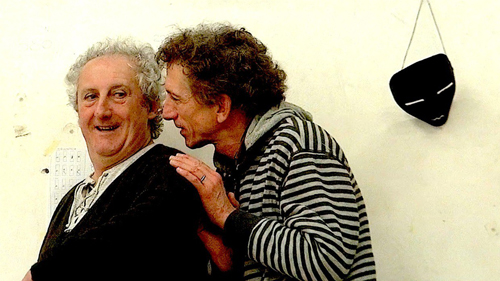In memory of Eugenio Allegri by Philip Radice
In tribute to Eugenio Allegri: Actor, Director, Maestro.
Early morning on the May 7th I received the news about Eugenio Allegri. My mind immediately wanted to refuse the truth of what I was hearing. My response was, ‘ You’ve got to be kidding!’. In five days Eugenio was to teach his iconic workshop on Commedia dell’Arte here at the school. He had been teaching it here for the last fifteen years. Of course Covid had impeded it for the period of the pandemic. Just this February we had finally fixed the date after two years and the day before it was to begin, he tested for Covid according to the State requirements, and unexpectedly we were thwarted again-result positive! Ha hah, the Commedia all’Improvviso. The disappointment was mutual and we sought to reorganize it immediately. What else could we do, we are both addicts of theatre arts, pushing as well as consuming.
I arrived in Torino in 1984, and I was introduced to him literally because he was teaching a workshop on Commedia dell’Arte! I was a recent graduate from the school of Jacques Lecoq, we immediately had a connection and a bond. He was the source to whom I was able to deepen my performance skills.
We are the same age, but his talent and skills were so obvious, it made me feel as if I was starting from scratch, a young novice. But from that moment, our mutual respect and friendship was launched, each on his own ship, yet in the same sea. And over the years at times we’d find ourselves at the same port, sharing notes, discussing the prospects, telling tales of treasures found, and those lost, we’d exchange some cargo whenever possible to enrich the other with what they didn’t have.
It seemed to me, of course, that I was the one who always got the better deal, though he insisted to the contrary. To me his ship was grand and well equipped often visited by royalty, the wealthy, the famous. Yet he’d make me feel that I had the greater treasure hidden in a ship half the size. He became in this school one of the vertebra that helped hold the spinal column straight. I’d like to believe that he and I had a “special” relationship, but in reality, it was Eugenio who most likely made everybody feel that way.
Two ships, one sea, and then each would leave the port again like two explorers in search of new land and resources. He worked with great talents, people of renown stature, men of politics. I remained dredging the waters to cultivate and train those persons that might be the next Dario Fo, Totò, Tatì, Sordi, even perhaps a new Allegri. A strange but functional friendship and collaboration, a sort of duet of commedia characters, at times zanies, doctors, captains, and yet more recently obviously pantaloon, not so much in character as in body! And yes it was functional! Matthias Martelli is one example of this extraordinary amalgam of Lecoq, Eugenio, Dario Fo, and Matthias’s training at this school, the place where they first met!
Eugenio, like many good teachers, taught the students not from a podium above, but from the humility of a buffoon, inspiring the young artist to never accept the limitations they think they may have, but how to convert them into advantages, like a clown turning the fiasco into a laugh, into a remedy, an antidote, an anecdote? Yet, he never let it jeopardize his authority over the command of his knowledge, or the respect for him he cultivated in the student and fellow actors.
You can’t perceive this if you don’t see and accept your own weaknesses. At the same time, he understood and conveyed you can’t concede to defeats or let self-deprivation and self-criticisms become impediments out of fear of failure. He wasn’t perfect, but he accepted the challenge to be perfect, even knowing that it was unattainable. This is true and honest humility. Have I idealized Eugenio? Perhaps, but that’s what friends do for each other that are actors, even though it may be a bit self-deceptive. It’s part of our trademark as an artist.
So I can’t help but think of the classic scene of Pantalone who fakes his death to hear what his family friends and servants have to say about him. And then, when they all have expressed their opinions in forms of compliments to finish in insults, he wakes up suddenly from his faked death, and chases everyone out of the room violently, kicking everybody in the ass, exposing us to our own silly humanity and defects. Spontaneously, the audience responds enthusiastically and, subsequently, to their delight, dies laughing! Thanks Eugenio for making it easier for all of us.
Philip Radice



